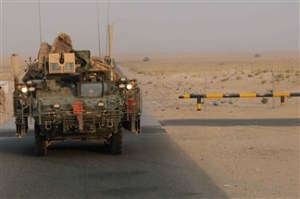The U.S. military has a usually-good policy of “after action” reports that tries to capture the “lessons learned” from every experience, from basic training to battlefield (the Army itself even has a Center for Army Lessons Learned). But sometimes that learning occurs in a less-structured way — like the experience gleaned over more than seven years of war in Iraq. That conflict takes another step toward its hope-for conclusion today as the U.S. officially wraps up combat ops there. Yes, there’s an asterisk bigger than that following Roger Maris’ 61 home runs — the 50,000 troops left behind until the end of next year, while largely dedicated to training Iraq security forces, remain primed to fight if attacked, or asked to do so by Baghdad.

Heading home...
Greg Jaffe has a good story in this morning’s Washington Post, detailing the “humility and caution” U.S. military officers feel about their experience in Iraq. That legacy, he suggests, is likely to act as a brake on the U.S. military. For the next quarter-century, senior officers will be well aware of the limits of kinetic — i.e., bullets and bombs — military might. The Army’s top officer has spoken of what is learned in combat. “We know about war now,” Gen. George Casey, the Army chief of staff, said over breakfast recently. “We went into there with a force that was largely not combat experienced. And now we have a hugely combat-seasoned force. That’s a huge difference in and of itself.”
Such seasoning not only makes soldiers better warriors, it also drills into them lessons about what is achievable, lessons that can never be learned in war games, no matter how realistic. Some of that pushback, in military discussions about Iran’s nuclear program, has a tougher edge to it than it would otherwise have. That’s a benefit the two wars now underway give the nation, as a kind of bonus. Both the Bush Administration and the U.S. military bobbled the waging of the war in Iraq. But remember: the U.S. military didn’t initiate this war; many senior officers expressed doubts about its wisdom before it even began. Yet as imperfect and rocky as it has been — and will continue to be — let’s take a moment today to toast the U.S. military, and the 4,416 troops lost in the effort, for a mission that looks increasingly — albeit imperfectly and incompletely — accomplished.


